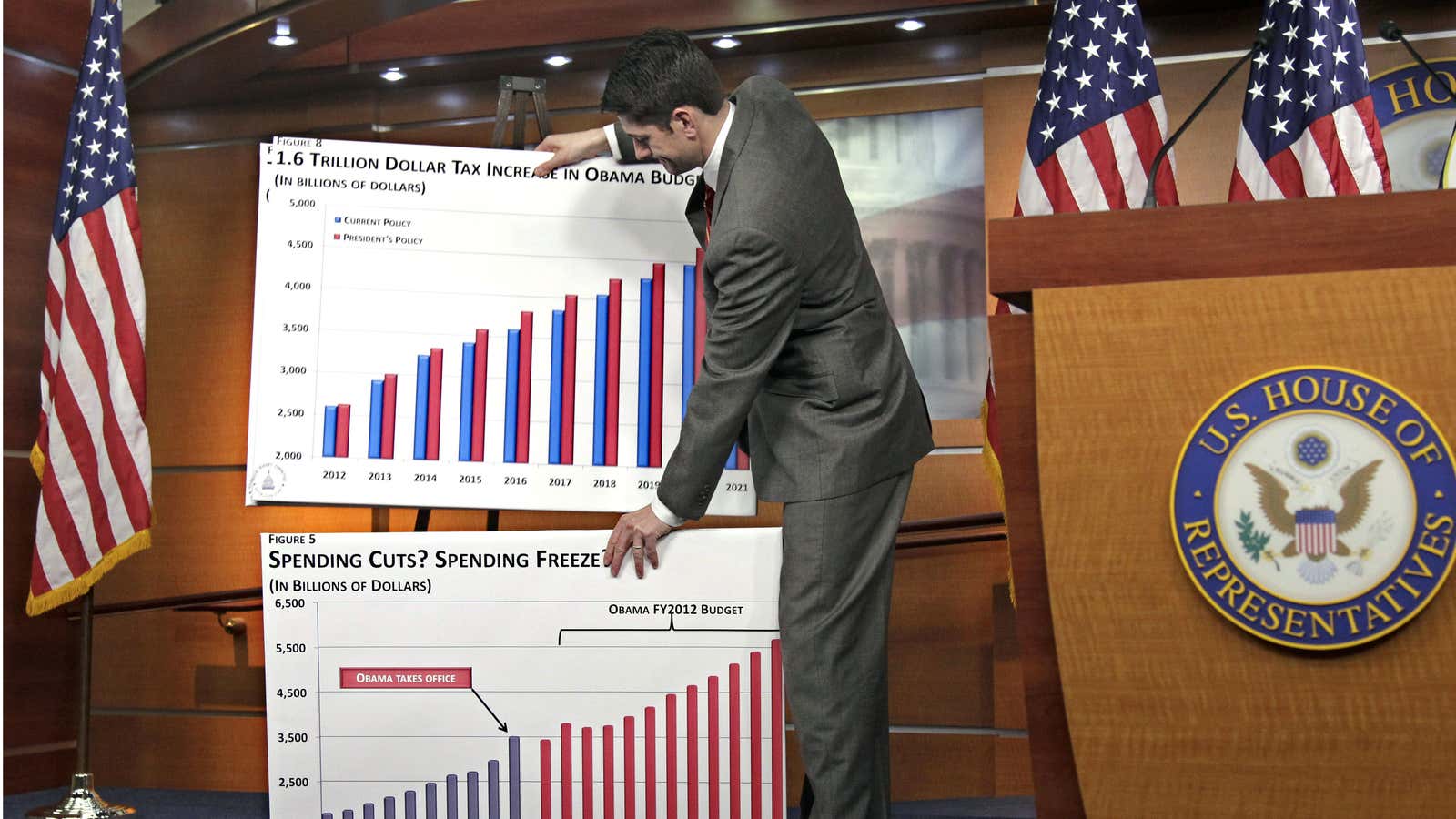The American vice presidential debate may be a side-show to educated pollsters, but the role has proven a fairly important one in the last two administrations, and Democrats are certainly desperate for anything that might shift the conversation away from President Barack Obama’s poor performance against Republican nominee Mitt Romney.
So who will Vice President Joe Biden, the six-term Senator and occasional comic figure, be facing off against in tonight’s debate?
Asked in April whether Wisconsin Congressman Paul Ryan might be a good running mate for Romney, Republican political insiders ranked Ryan a tie for third place. He was a party leader, sure, and an attractive spokesman, but his plans for health care entitlements are controversial. A tendency to upstage the man in charge, too—look how uneasy his relationship is with Speaker of the House John Boehner, his nominal leader.
On Aug. 11, he was introduced as the Republican vice-presidential candidate.
Ryan has a tendency to move fast. He was elected to the national legislature at age 29 in 1999, but I began covering him 10 years later, when he charged himself with articulating his party’s intellectual opposition to a newly-elected President Obama. He helped turn the House back to Republican control in 2010, becoming the Chairman of the Budget Committee. I remember congratulating a magazine writer who became a Ryan speechwriter during this time for joining a rising operation.
After Romney’s energetic, if frequently disingenuous, debate performance on Oct. 3 outshone a listless Obama and gave the conservative ticket momentum, Ryan’s job will be to maintain the pace. Before the debate, conservatives complained that Romney wasn’t deploying Ryan, who has been limited to local events and media and is avoiding the national spotlight, widely enough to spread his message. They may have a point. One thing I learned covering Ryan is that he’s a singular communicator for some fairly radical proposals. Here’s how he does it:
He’s got a nose for the big issue. Ryan’s formative years in Washington after college were spent absorbing conservative economic doctrine that convinced him of the importance of a dramatically limited public sector. But as member and then chairman of the Budget Committee, he had little official responsibility: The committee sets broad spending levels in consultation with party leaders. Nonetheless, he’s famous for his plans to privatize and reduce spending on Medicare, America’s public senior health insurance plan. Ryan made entitlements his cause when he realized they were a big driver of government spending, which left the members of his party ostensibly responsible for overseeing the programs rather miffed.
He knows a bipartisan deal sounds nice. Ryan has frequently praised a debt reduction plan released by the bipartisan Bowles-Simpson commission in 2010, and dinged President Obama for not accepting its recommendations outright. He doesn’t always mention that as a member of the commission, he voted against the plan because it increased taxes as well as cutting spending. While he has collaborated with Democrats like former budget director Alice Rivlin and Oregon Senator Ron Wyden on health care reform plans. He doesn’t always mention that both collaborators have decried Romney’s plans.
He manages expectations. The Martyrology of Paul Ryan is long and varied; he is well-versed in clearing ground ahead of proposals that cut social spending on the poor and seniors. ”We are we are giving them a political weapon to go against us,” he said after introducing one budget plan. “But they will have to lie and demagogue to make it a weapon.” Democrats cut his plan to ribbons in the press, but Ryan got courage points for handing them the knife. I’m not sure why the media likes this.
He loves numbers.* Despite regular panic about American students’ math scores, don’t let anyone tell you this is a country that doesn’t love its math (it’s not the same as being numerate). Ryan’s main reputation, in an era of democratized economics where anyone with an internet connection can pore over budget projections, is for engaging in wonky policy debates about the challenges of financing a national insurance system, bolstering his arguments with charts and tables. But he gets dinged by policy experts for failing to fill in all the blanks–in their estimation, his plans are more focused on cutting taxes and public spending than cutting government borrowing. Sometimes, he just runs out of time.
He’s a true believer. Ryan’s greatest strength, though, is that he can frame policy choices in gripping, ideological terms. “It’s really a cultural decision over who we are and what kind of country we want to be,” he said in a 2010 speech. “Do we want to have an opportunity society with a safety net where we are pushing prosperity to its limits, where we are extending the economic growth to more and more people, where we are reclaiming the American idea of incentivizing entrepreneurship, hard work, production, achievement, and growing our economy, or are we going to go down the path of having a cradle-to-grave, European-style social welfare state?” You can guess Ryan’s preference.
Tonight, Democrats say he’ll have to address his long record on Medicare, which could hurt the Republican ticket’s chances with seniors. Ryan’s main goal will be deploying his plainspoken zeal to promote Romney while separating the campaign’s Medicare message from his own pathbreaking plans. And Biden? Well, let’s just say that Ryan won’t be the only politician in the room with ambitions.
*The numbers don’t always love him: He’s endured questions about how fast he can run a marathon, how many mountains he’s climbed, and even what his BMI is.
